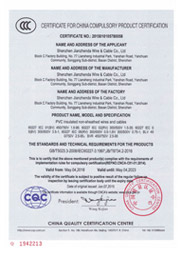 Author: Joey Wan
Author: Joey Wan  July 02,2022
July 02,2022
If you're working on a home improvement project or major construction work, one of the most important materials you'll need to find is electrical wiring. Much of modern life depends on electricity and the devices, appliances, appliances and machines that use it. While few people can go all day without encountering or needing electricity, most people around the world use it hundreds of times in a day.
Just consider all the items in your home. Your TV, refrigerator, microwave and dishwasher all need electricity and wires to run. Most likely, you have a washer, dryer, and automatic garage door. In addition to all these larger appliances and devices, our lives are filled with electronic devices. Americans rely on laptops, cell phones, tablets and other portable devices. Modems, servers and hard drives power our business. There is no denying the importance of wires to our lives.
As we know, there are so many items that are essential to sustain life, and going forward, wire manufacturers must use better materials; generally, good copper materials can be used as wires with better electrical conductivity, and electrical conductors are defined For materials with mobile charged particles, we call these electrons. When electricity hits a metal, these electrons start moving fast. The current will pass through the wire conductors, thus conducting electricity.
Therefore, the best metallic conductors are those with good electron mobility. Conversely, metals that make poor conductors will have low electron mobility. The two best conductors are silver and copper. For this reason, electricians, construction workers, developers and those in the telecommunications industry prefer to use both materials in electrical wiring.
Silver is the best conductor of electricity. Despite silver's enormous ability to conduct electricity, it is not typically used in electrical wiring. The reason is that silver is much more expensive than the other option, copper. Instead, silver is used in high-end specialty devices where impressive conductivity is required and price doesn't matter. For example, silver is used in satellites and circuit boards.
Silver is also used in small amounts in some of our common equipment. Instead of forming the entire cable or wire, silver is used in electrical switches to connect the contacts of the switch, it is one, and separates the contacts when it is closed. When used in this small amount, it is still an economical option. Silver contacts can be found in the wires of cars, trucks, SUVs and other vehicles. The same style of contacts is also popular in industrial machines.
While copper and silver are considered the two main conductive materials, aluminum is a close second. Additionally, this metal has properties that separate it from copper when it comes to everyday electrical wiring. That characteristic is weight. While copper can be heavy, despite its malleable properties, aluminum is very light. This makes it an ideal material for overhead phone lines and similar projects.
In fact, when comparing wire conductor materials per unit weight, aluminum is less expensive than copper and conducts quite well. However, aluminum has certain properties that make it unusable in many situations. Aluminum forms anti-electron oxides on its surface. At first, this will just cause the device to overheat, but if the aluminum is exposed to these elements for a long time, it will stop conducting electricity entirely.
This would be a nightmare for portables, modems and similar. In addition, it prevents aluminum from being used in any environment that is exposed to salt or heat. Instead, copper is often used for better wire because it not only makes it easy to make electrical coils, but also resists corrosion from salt, heat, and other harsh environments.
Steel is generally considered a building material. It is heavy, durable and inflexible. These qualities make it the most common choice for building skyscrapers and warehouses. Any structure that needs to be large, immovable and strong will likely contain some steel beams. However, steel is an alloy of iron that conducts electricity. The problem is that it is nearly impossible to make steel into the shapes and sizes needed to make electrical wires. Steel is often used to wrap wires or other conductors, which is a better use for durable materials.
At JZD Cable, we supply wires in a variety of lengths, diameters and sizes. Our goal is to provide any builder, renovator or electrician with the exact wiring needed to complete a project. Regardless of size or experience, we are happy to discuss wiring sold through Jianzhenda and more suitable options for your project.
Well, the above is the introduction of " which is the best choice for wire conductors among materials with strong electrical conductivity ", I hope it can help everyone! It is recommended to continue to pay attention to JZD Cable to learn more about wire information.
